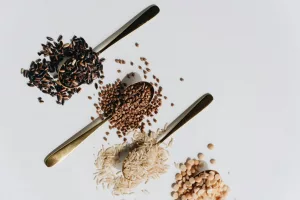12 Best Foods to Support Joint Health and Mobility

Maintaining joint health and mobility is essential for staying active and preventing the pain and stiffness associated with arthritis, inflammation, and age-related joint wear and tear. The health of your joints depends largely on nutrition, as certain foods provide the nutrients necessary to reduce inflammation, protect cartilage, and strengthen bones. Adding specific foods that support joint flexibility, reduce joint pain, and protect tendons and ligaments can help ensure that you stay mobile and pain-free as you age.
In this article, we’ll explore the 12 best foods that support joint health, improve mobility, and reduce inflammation, helping you maintain a healthy, active lifestyle.
1. Fatty Fish (Salmon, Mackerel, Sardines)
Fatty fish such as salmon, mackerel, and sardines are among the best foods for promoting joint health due to their high content of omega-3 fatty acids. Omega-3s are known for their powerful anti-inflammatory properties, which can help reduce the inflammation associated with arthritis and other joint disorders. By lowering cytokine levels (proteins that promote inflammation), omega-3s help alleviate joint stiffness, pain, and swelling.
Fatty fish are also an excellent source of vitamin D, which is essential for maintaining healthy bones and joints. Vitamin D helps the body absorb calcium, which strengthens bones and supports cartilage health. A deficiency in vitamin D can lead to joint pain and an increased risk of developing osteoporosis.
Incorporating fatty fish into your diet at least two to three times a week can help improve joint mobility, reduce inflammation, and promote overall joint health.
2. Chia Seeds
Chia seeds are packed with omega-3 fatty acids, making them a plant-based alternative for supporting joint health and reducing inflammation. In addition to omega-3s, chia seeds are high in fiber and antioxidants, which help fight oxidative stress and protect cartilage from damage.
The anti-inflammatory properties of chia seeds can help reduce joint swelling and improve mobility, particularly for individuals with rheumatoid arthritis or other inflammatory joint conditions. Chia seeds are also rich in calcium and magnesium, which support bone health and maintain strong, flexible joints.
Add chia seeds to smoothies, oatmeal, or yogurt for an easy way to boost your intake of these joint-protecting nutrients. Their versatility and nutrient density make them an excellent addition to any diet focused on joint health.
3. Turmeric
Turmeric is a powerful anti-inflammatory spice that has been used for centuries in traditional medicine to relieve joint pain and improve mobility. The active compound in turmeric, curcumin, has been shown to inhibit inflammatory cytokines and enzymes that contribute to joint inflammation, making it particularly beneficial for individuals with osteoarthritis or rheumatoid arthritis.
Curcumin’s antioxidant properties also help protect cartilage from oxidative stress and promote the healing of joint tissues. Regular consumption of turmeric can reduce joint stiffness, improve flexibility, and reduce pain, especially when paired with black pepper, which enhances curcumin absorption.
To reap the joint health benefits of turmeric, add it to curries, soups, smoothies, or teas. You can also take turmeric supplements to support long-term joint health and mobility.
4. Broccoli
Broccoli is part of the cruciferous vegetable family and is rich in sulforaphane, a compound that has been shown to block the enzymes responsible for cartilage breakdown in joints. Sulforaphane helps protect cartilage from damage and reduces inflammation, making broccoli a powerful food for joint health.
In addition to sulforaphane, broccoli is high in vitamin K, vitamin C, and calcium, all of which support bone health and help maintain strong, flexible joints. Vitamin C in particular helps the body produce collagen, a key protein that strengthens cartilage and improves joint elasticity.
Incorporating broccoli and other cruciferous vegetables like Brussels sprouts and cauliflower into your diet can help protect your joints from damage and reduce inflammation.
5. Berries
Berries, such as blueberries, strawberries, and raspberries, are packed with antioxidants, particularly anthocyanins, which help reduce inflammation and protect joints from oxidative stress. These antioxidants help neutralize free radicals, which can damage cartilage and lead to joint pain and stiffness.
In addition to their anti-inflammatory benefits, berries are rich in vitamin C, which helps maintain the structural integrity of cartilage and promotes collagen production. The combination of antioxidants and vitamin C makes berries a powerful food for promoting joint health and preventing the wear and tear associated with aging.
To enjoy the joint-supporting benefits of berries, add them to smoothies, salads, or oatmeal, or enjoy them as a snack. Their sweet and tart flavor makes them a delicious way to protect your joints and maintain mobility.
6. Walnuts
Walnuts are a rich source of omega-3 fatty acids, particularly alpha-linolenic acid (ALA), which helps reduce joint inflammation and improve flexibility. Omega-3s in walnuts help lower inflammatory markers in the body, reducing the pain and stiffness associated with arthritis and other joint conditions.
In addition to their omega-3 content, walnuts contain polyphenols, antioxidants that help protect cartilage from oxidative damage. Regular consumption of walnuts has been shown to reduce the risk of joint degeneration and promote overall joint health.
Walnuts make an easy and portable snack, or they can be added to salads, oatmeal, or baked goods for a nutritious, joint-protecting boost.
7. Olive Oil
Olive oil, particularly extra virgin olive oil, is a key component of the Mediterranean diet and is well-known for its anti-inflammatory properties. Olive oil contains a compound called oleocanthal, which has been shown to have similar effects to nonsteroidal anti-inflammatory drugs (NSAIDs) in reducing pain and inflammation in the joints.
In addition to its anti-inflammatory benefits, olive oil is rich in monounsaturated fats and antioxidants that protect joint tissues and support cartilage health. Regular consumption of olive oil has been shown to improve joint mobility and reduce the symptoms of rheumatoid arthritis.
To incorporate olive oil into your diet, use it as a base for salad dressings, drizzle it over roasted vegetables, or use it in cooking to replace less healthy fats. Its mild flavor and versatility make olive oil an easy way to support joint health.
8. Ginger
Ginger is another anti-inflammatory food that has been used for centuries to relieve joint pain and improve mobility. The active compounds in ginger, gingerols and shogaols, have powerful anti-inflammatory effects, helping to reduce joint swelling and stiffness.
Ginger also helps inhibit the production of pro-inflammatory cytokines, making it beneficial for individuals with chronic joint conditions such as osteoarthritis or rheumatoid arthritis. In addition to reducing pain and inflammation, ginger promotes healthy digestion, which can support nutrient absorption and overall joint health.
Incorporate ginger into your diet by adding fresh or powdered ginger to teas, smoothies, soups, or stir-fries. Ginger supplements are also available for those looking for a more concentrated dose of this joint-supporting spice.
9. Sweet Potatoes
Sweet potatoes are rich in beta-carotene, a powerful antioxidant that helps protect joints from oxidative damage and supports healthy cartilage. Beta-carotene is converted into vitamin A in the body, which is essential for immune function and tissue repair, both of which are important for maintaining healthy joints.
In addition to beta-carotene, sweet potatoes are high in fiber and potassium, which help reduce inflammation and support overall joint health. Potassium plays a crucial role in fluid balance, helping to reduce joint stiffness and improve flexibility.
Sweet potatoes can be roasted, mashed, or added to soups and stews for a delicious and nutritious way to support joint mobility and reduce inflammation.
10. Green Tea
Green tea is rich in polyphenols, particularly epigallocatechin gallate (EGCG), which has been shown to reduce inflammation and slow the breakdown of cartilage in people with osteoarthritis. EGCG has powerful antioxidant effects that help protect joints from oxidative stress and reduce joint degeneration.
In addition to its anti-inflammatory benefits, green tea helps improve bone density and supports the health of synovial fluid, the lubricating fluid that cushions joints. Regular consumption of green tea can help reduce joint pain, improve mobility, and promote long-term joint health.
Enjoy green tea as a soothing beverage, or incorporate it into smoothies or broths for a gentle and effective way to support joint health.
11. Pineapple
Pineapple is a tropical fruit that contains bromelain, an enzyme with powerful anti-inflammatory and pain-relieving properties. Bromelain has been shown to reduce joint swelling and improve mobility in individuals with osteoarthritis and other joint conditions.
In addition to its anti-inflammatory benefits, pineapple is rich in vitamin C, which supports collagen production and helps maintain the integrity of joint cartilage. The combination of bromelain and vitamin C makes pineapple an excellent food for reducing joint pain and improving flexibility.
Enjoy fresh pineapple as a snack, add it to fruit salads, or blend it into smoothies for a delicious and joint-supporting treat.
12. Bone Broth
Bone broth is a nutrient-dense food that contains high levels of collagen, gelatin, and amino acids, all of which are essential for maintaining healthy joints and connective tissues. Collagen is the main protein in cartilage, and consuming it can help improve joint flexibility, reduce pain, and support the healing of joint tissues.
Bone broth also contains glucosamine and chondroitin, natural compounds found in cartilage that help reduce joint pain and inflammation. These compounds are commonly found in supplements for joint health, but bone broth provides a natural and easily digestible source of these nutrients.
Incorporate bone broth into your diet by sipping it as a warm beverage or using it as a base for soups and stews. Regular consumption of bone broth can help protect and strengthen your joints, reducing the risk of pain and injury.
Supporting joint health and maintaining mobility requires a combination of anti-inflammatory foods, healthy fats, and nutrients that protect cartilage and reduce inflammation. Incorporating these 12 joint-supporting foods into your diet can help improve flexibility, reduce joint pain, and protect against age-related joint degeneration. From omega-3-rich fatty fish and walnuts to anti-inflammatory spices like turmeric and ginger, these foods will provide your joints with the nutrients they need to stay healthy, strong, and flexible as you age.


